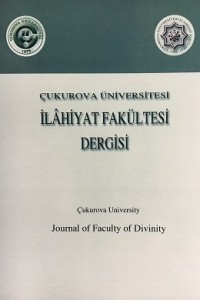Öz
Bu çalışma, otobiyografik bir romanda kültürel kimliğin varlığını gösterme
çabasıdır. Çünkü kültürel araştırmalar, romancının romanında betimlediği sosyal hayatı,
gelenek ve görenekleri aydınlatarak eleştirel bir bakış açısı sunar. Araştırmacı,
bu gayeyi gerçekleştirmek için roman ile otobiyografi arasında çatışma ve
buluşma noktaları ortaya çıkarmaktadır ve romandan hareketle kültürel kimliği
tasvir edecek özelliklere ışık tutmaktadır. Bu çalışmada Suudi Arabistanlı
Ahmed Ebu Dehman’ın el-Hizam adlı romanındaki kültürel kimliğe temas
edilmiştir. Bu roman, ihtiva ettiği hadiselerin Suudi Arabistan’ın güneyindeki
“Asir” bölgesinde geçmesi ve petrolün keşfedilip çıkarılmaya başlandığı dış
dünyaya açılımın gerçekleştiği bir zaman diliminde meydana gelmesine binaen
seçilmiştir. Romanı önemli kılan özellik, bu yeni gelişmelerin mevcut kültürel
yapıyla çelişen ve çatışan yanlarını, çağdaş Suudi Arabistan toplumunda kabileden
devlete geçiş sürecini işlemiş olmasıdır.
Anahtar Kelimeler
Kaynakça
- Abbas, İhsan, Fennu’s-Sîre, Dâru’ş-Şurûk, Ammân, 1996.
- Câhız, Amr b. Bahr, el-Hayvân, Thk. Abdüsselâm Hârun, 2. Baskı, Mektebetü’l-Bâbi’l-Halebî, Kâhire, 1968.
- Dayf Şevki, et-Tercemetü’ş-Şahsiyye, 4. Baskı, Dâru’l-Ma'ârif, Kâhire, t.y.
- Ebû Dehmân, Ahmed, el-Hizâm, 1. Baskı, Beyrut, Dâru’s-Sâkî, 2001.
- ed-Derğâmî, Zâyed Âdil, es-Sîretü’z-Zâtiyye, Mecelletü Alâmât fi’n-Nakd, No:65-66, 2008.
- el-Uceyli, şehle, en-Nassu’r-Rivâî ve Düvelü’l-Hüviyyetü’s-Sekâfiyye, Mecelletü Alâmât fi’n-Nakd, No:53, 2004.
- Hân, Muhammed, el-Esâtiru’l-Arabiyye Kable’l-İslâm, Matbaatu Lecneti’t-Te’lîf ve’t-Tercüme ve’n-Neşr, Kâhire, 1937.
- May, George, es-Sîretü’z-Zâtiyye, trc. Muhammed el-Kâdî-Abdullah Sûle, Beytü’l-Hikme, Tunus, 1992.
- Philippe Lejuene, es-Sîratü’z-Zâtiyyetü’l-Mîsâk ve’t-Târih’l-Edebî, trc. Ömer Huliy, 1. Baskı, Dâru’l-Beydâ el-Merkezu’s-Sekâfî el-Arabî, y.y., 1994.
- Pierre Bourdieu, el-Unfu’r-Remzî, trc. Nazir Cahil, el-Merkezu’s-Sekâfî’l-Arabî, Beyrut, 1994.
- Usfûr, Câbir, Zamanu’r-Rivâye, el-Hey’etü’l-Mısriyyetü’l-Âmme li’l-Küttâb, Kâhire, 1999.
Öz
This study is an
attempt to highlight the presence of cultural identity in the autobiographical
novel, in a context which cultural studies have come to
occupy a wide range of critical practice, due to their insights into the social
life and customs and traditions depicted by the novelist in his novel.
The researcher presents
the points of intertwining and convergence between autobiography and novel, and sheds light on
the reasons for the novel's ability to transmit cultural identity.
Al-hizam is the
first novel written by a Saudi writer in French. The novel is set in a remote
village in southern Saudi Arabia "Asir", depicting the
world of childhood, life, social and tribal
relations, and the sudden change in the society due to the oil
boom that upset many axioms controlled the life of the community.
This novel has been selected because the specificity
of Asir's region in the south of Saudi Arabia, and the importance
of the period, namely the period of the oil
boom, and openness to the outside world, which appeared in
the conflict of values and cultures in a way that makes the novel an Important
text to understand the process of transition from tribe to state in
contemporary Saudi society.
Anahtar Kelimeler
Kaynakça
- Abbas, İhsan, Fennu’s-Sîre, Dâru’ş-Şurûk, Ammân, 1996.
- Câhız, Amr b. Bahr, el-Hayvân, Thk. Abdüsselâm Hârun, 2. Baskı, Mektebetü’l-Bâbi’l-Halebî, Kâhire, 1968.
- Dayf Şevki, et-Tercemetü’ş-Şahsiyye, 4. Baskı, Dâru’l-Ma'ârif, Kâhire, t.y.
- Ebû Dehmân, Ahmed, el-Hizâm, 1. Baskı, Beyrut, Dâru’s-Sâkî, 2001.
- ed-Derğâmî, Zâyed Âdil, es-Sîretü’z-Zâtiyye, Mecelletü Alâmât fi’n-Nakd, No:65-66, 2008.
- el-Uceyli, şehle, en-Nassu’r-Rivâî ve Düvelü’l-Hüviyyetü’s-Sekâfiyye, Mecelletü Alâmât fi’n-Nakd, No:53, 2004.
- Hân, Muhammed, el-Esâtiru’l-Arabiyye Kable’l-İslâm, Matbaatu Lecneti’t-Te’lîf ve’t-Tercüme ve’n-Neşr, Kâhire, 1937.
- May, George, es-Sîretü’z-Zâtiyye, trc. Muhammed el-Kâdî-Abdullah Sûle, Beytü’l-Hikme, Tunus, 1992.
- Philippe Lejuene, es-Sîratü’z-Zâtiyyetü’l-Mîsâk ve’t-Târih’l-Edebî, trc. Ömer Huliy, 1. Baskı, Dâru’l-Beydâ el-Merkezu’s-Sekâfî el-Arabî, y.y., 1994.
- Pierre Bourdieu, el-Unfu’r-Remzî, trc. Nazir Cahil, el-Merkezu’s-Sekâfî’l-Arabî, Beyrut, 1994.
- Usfûr, Câbir, Zamanu’r-Rivâye, el-Hey’etü’l-Mısriyyetü’l-Âmme li’l-Küttâb, Kâhire, 1999.
Öz
هذه الدراسة هي
محاولة لإبراز حضور الهوية الثقافية في رواية السيرة الذاتية، وذلك في سياق أصبحت
فيه الدراسات الثقافية تحتل حيزًا واسعًا في الممارسة النقدية نظرًا لما تقدمه من
إضاءات على الحياة الاجتماعية والعادات والتقاليد التي يصورها الروائي في سيرته/
روايته. وفي سبيل تحقيق هذا الهدف، قام الباحث بعرض نقاط التشابك والتلاقي بين
السيرة الذاتية والرواية، وألقى الضوء على الإمكانات التي تمتلكها الرواية لجهة
تصوير مفردات الهوية الثقافية. وعرض الباحث بعد ذلك للمفردات الثقافية الموجودة في
رواية "الحزام" للكاتب السعودي أحمد أبو دهمان، وقد كان اختيار هذه
الرواية نابعًا من خصوصية المنطقة التي تدور فيها أحداث الرواية، وهي منطقة عسير
في جنوب المملكة العربية السعودية، ومن أهمية المرحلة الزمنية التي تدور فيها
الأحداث، وهي مرحلة الفورة النفطية، والانفتاح على العالم الخارجي، الأمر الذي ظهر
في تعارض القيم والثقافات على نحو يجعل الرواية نصًا مهمًا في فهم سيرورة الانتقال
من القبيلة إلى الدولة في المجتمع السعودي المعاصر.
Anahtar Kelimeler
Kaynakça
- Abbas, İhsan, Fennu’s-Sîre, Dâru’ş-Şurûk, Ammân, 1996.
- Câhız, Amr b. Bahr, el-Hayvân, Thk. Abdüsselâm Hârun, 2. Baskı, Mektebetü’l-Bâbi’l-Halebî, Kâhire, 1968.
- Dayf Şevki, et-Tercemetü’ş-Şahsiyye, 4. Baskı, Dâru’l-Ma'ârif, Kâhire, t.y.
- Ebû Dehmân, Ahmed, el-Hizâm, 1. Baskı, Beyrut, Dâru’s-Sâkî, 2001.
- ed-Derğâmî, Zâyed Âdil, es-Sîretü’z-Zâtiyye, Mecelletü Alâmât fi’n-Nakd, No:65-66, 2008.
- el-Uceyli, şehle, en-Nassu’r-Rivâî ve Düvelü’l-Hüviyyetü’s-Sekâfiyye, Mecelletü Alâmât fi’n-Nakd, No:53, 2004.
- Hân, Muhammed, el-Esâtiru’l-Arabiyye Kable’l-İslâm, Matbaatu Lecneti’t-Te’lîf ve’t-Tercüme ve’n-Neşr, Kâhire, 1937.
- May, George, es-Sîretü’z-Zâtiyye, trc. Muhammed el-Kâdî-Abdullah Sûle, Beytü’l-Hikme, Tunus, 1992.
- Philippe Lejuene, es-Sîratü’z-Zâtiyyetü’l-Mîsâk ve’t-Târih’l-Edebî, trc. Ömer Huliy, 1. Baskı, Dâru’l-Beydâ el-Merkezu’s-Sekâfî el-Arabî, y.y., 1994.
- Pierre Bourdieu, el-Unfu’r-Remzî, trc. Nazir Cahil, el-Merkezu’s-Sekâfî’l-Arabî, Beyrut, 1994.
- Usfûr, Câbir, Zamanu’r-Rivâye, el-Hey’etü’l-Mısriyyetü’l-Âmme li’l-Küttâb, Kâhire, 1999.
Ayrıntılar
| Birincil Dil | Arapça |
|---|---|
| Bölüm | Makaleler |
| Yazarlar | |
| Yayımlanma Tarihi | 27 Aralık 2019 |
| Gönderilme Tarihi | 25 Ağustos 2019 |
| Yayımlandığı Sayı | Yıl 2019 Cilt: 19 Sayı: 2 |
Kaynak Göster
Cited By
مدينة دمشق في روايات خيري الذهبي
Çukurova Üniversitesi İlahiyat Fakültesi Dergisi (ÇÜİFD)
https://doi.org/10.30627/cuilah.1430476
Correspondence Address
Cukurova University, Faculty of Theology, Balcali Campus, 01330, Saricam/Adana.


